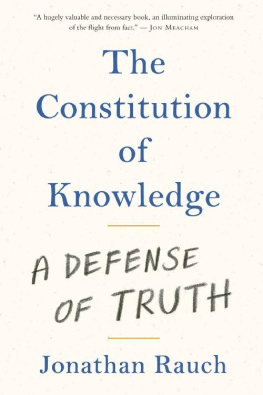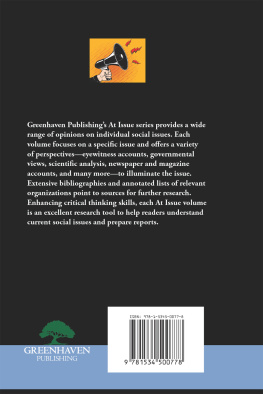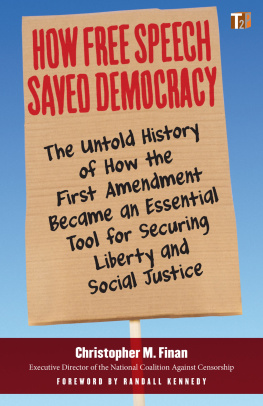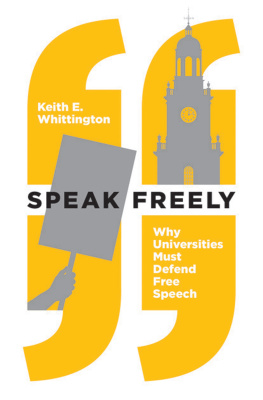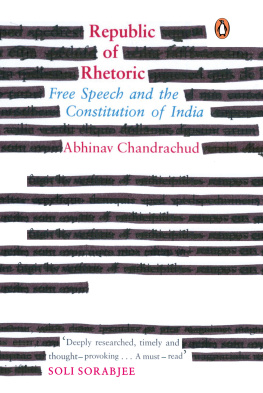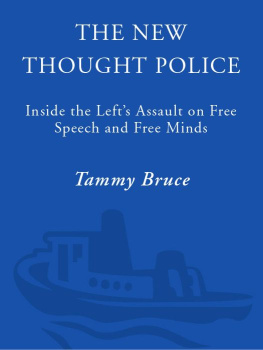Jonathan Rauch is a senior fellow in governance studies at the Brookings Institution, a contributing editor to the Atlantic and National Journal, and the author of six books, including Governments End and Gay Marriage: Why It Is Good for Gays, Good for Straights, and Good for America.
The University of Chicago Press, Chicago 60637
The University of Chicago Press, Ltd., London
1993, 2013 by Jonathan Rauch
Foreword 2013 by George F. Will
All rights reserved. Original edition published 1993.
Expanded edition 2013
Produced in the United States of America
22 21 20 19 18 17 16 15 14 13 1 2 3 4 5
ISBN-13: 978-0-226-13055-2 (e-book)
DOI: 10.7208/chicago/9780226130552.001.0001
Library of Congress Cataloging-in-Publication Data
Rauch, Jonathan, 1960 author.
Kindly inquisitors : the new attacks on free thought / Jonathan Rauch. Expanded edition.
pages ; cm
Includes bibliographical references and index.
ISBN 978-0-226-14593-8 (pbk. : alk. paper) ISBN 978-0-226-13055-2 (e-book) 1. CensorshipUnited States. 2. United StatesIntellectual life20th century. I. Title.
Z658.U5R38 2013
363.310973dc23
KINDLY INQUISITORS
The New Attacks on Free Thought
Expanded Edition
JONATHAN RAUCH
The University of Chicago Press
Chicago and London
A Cato Institute Book
In Memoriam
Frank Kameny, 19252011
Who never hesitated to correct anyone
Upon this first, and in one sense this sole, rule of reason, that in order to learn you must desire to learn, and in so desiring not be satisfied with what you already incline to think, there follows one corollary, which itself deserves to be inscribed upon every wall of the city of philosophy:
Do not block the way of inquiry.
Charles Sanders Peirce
CONTENTS
ACKNOWLEDGMENTS
Among the many people who have helped with this book, a few require special thanks: Christopher C. DeMuth of the American Enterprise Institute and David Boaz of the Cato Institute, whose support made the book possible; the Esther A. and Joseph Klingenstein Fund, which helped finance my research; David Hull, for intellectual generosity far beyond the call of duty; and Donald Richie, who kept the faith.
FOREWORD
In 2007, Keith John Sampson, a middle-aged student working his way through Indiana UniversityPurdue University Indianapolis as a janitor, was declared guilty of racial harassment. His offense, according to the university administration, was openly reading [a] book related to a historically and racially abhorrent subject.
One wonders: Was openly an important part of the offense, or was the critical consideration that the book was related to something abhorrent? George Orwell was right: there are some absurdities of which only intellectuals are capable.
The book that got Sampson into such hot water was Notre Dame vs. the Klan. It celebrated the 1924 defeat of the Ku Klux Klan, which was powerful in Indiana in the 1920s, in a fight with Notre Dame students. But some of Sampsons coworkers disliked the books dust jacket, which featured a black-and-white photograph of a Klan rally. The coworkers did not commit the solecism of judging the book by its cover. Rather, they judged the cover. Someone was offended, therefore someone must be guilty of something, because among the freshly minted entitlements is the new right not to be annoyed or otherwise distressed.
The new entitlement is asserted in the workplace. (Be careful what religious or political message your T-shirt communicates to others on the factory floor who might be made uncomfortable.) The entitlement impinges on social-science research and policy discussions. (Remember the acid rain of accusations of insensitivity that fell upon the young Daniel Patrick Moynihan when he first forced the nation to begin thinking about family disintegration among African Americans? So, tread softly if you step onto the dark and bloody ground of social policy that addresses problems where race and sexuality are factors.) The new entitlement not to be distressed crops up in some high school biology classes when evolution is taught. And, of course, the entitlement flourishes on campuses, where people are taught that taking offense is a sign of intellectual acuity and moral refinement. New rights tend to trump old rights, such as those protected, or so we once thought, by the First Amendment.
So nowadays, library shelves groan beneath the weight of books documenting the proliferation of such instances of freedom assaulted in the name of a rival and superior value. Hardly a week passes without a fresh example of kindly inquisitors using administrative power to enforce virtue, as they understand it. Persons who dismiss stories such as those of Keith John Sampson as merely anecdotal need to be reminded that the plural of anecdote is data.
We have data in depressing abundance. What is needed is a book that explores the reasons that, for several generations now, so much ingenuity in the field of First Amendment jurisprudence and so much intellectual energy in the field of social theory have been devoted to justifying the practice of balancing freedom of speech against other social objectives. What is needed is a book explaining why the usual, and intended, result of this practice is a finding that those objectivessensitivity, community harmony, social tranquility, inclusiveness, multiculturalism, and so onare more worthy than the objective of maintaining a liberal regime of protected expression. What is needed, now more than ever, is this book.
In it, twenty years ago, Jonathan Rauch clearly saw what has now become apparent to less-prescient observers. He saw that the increasingly righteous and indiscriminate enforcement of civility in societys discussions and debates was provoking discord. The enforcement was fomenting a perverse competition to see which groups could claim to be the most, and most frequently, offended and to decide which groups being offended matters. This competition is why one of Americas growth industries is the manufacturing of synthetic indignation.
Rauch is a reasonable man whose only mistake is one common among the temperate: he assumes that others are as reasonable as he is. Hence the excessively kind title of his book. It is, to say no more, permissible to doubt that the inquisitors who are imposing, with speech codes and other measures, a reign of virtue wherever they can are kindly. The unvarnished truth is that some people derive intense pleasure from bossing around other people. The fact that they also may really believe they are improving the people who are under their thumb or are improving the world does not make them kindly. Although Torquemada thought he was pleasing God and saving souls from Satan, it would be peculiar to call him kindly.
In the afterword to this edition of his book, Rauch explores how epistemologythe field of philosophy that explores the foundations of knowledgebolsters the argument for a regime of freedom of expression. He stresses the social, meaning public, process by which propositions are tested and truth is ascertained. His point is this: What epistemology, properly understood, teaches about how we acquire knowledge validates the premises of an open society.
He is correct. There is, however, another and darker facet of the impact of epistemology, improperly understood, on the problem of defending freedom against those who steadily toil to constrict it. This is the story of how consciousness came to be conceived of as a political problem and of how the conquest of consciousness became not just a political project, but the great project of people who are prepared to impose progress on people whose understanding of it is insufficient.
Next page

